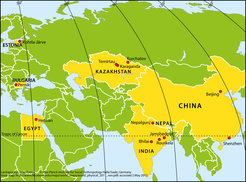Industry and Inequality in Eurasia

The Group
The Institute’s post-doctoral project group on Industry and Inequality in Eurasia was launched in September 2012 to investigate the impact and experience of industrial life in different regions outside western Europe. It is led by Catherine Alexander (University of Durham), Chris Hann (MPI for Social Anthropology) and Jonathan Parry (London School of Economics and Political Science). The group comprises six postdoctoral research fellows and two research associates, who conduct ethnographic fieldwork in industrial workplaces and neighbourhoods.
Point of Departure
The aim of the group is to contribute to the discipline of economic anthropology through fieldwork-based investigations of industrial work and the changing character of the labour force. By relativizing the way in which the early history of industrialization in Europe has inflected understandings of class, social differentiation and political struggle, new perspectives will be developed on resilience and transformation under neoliberal capitalism. The group looks at power, hierarchy and economy in a broad range of different industrial contexts in Eurasia with a view to qualifying and re-formulating western social science understandings of class and status.
The group pays particular attention to the intersections between economic inequality and hierarchies of gender, ethnicity and age, and how the political struggles of industrial workers are constituted.
The project concentrates on large enterprises in heavy-industrial sectors such as steel and mining, where researchers investigate neoliberal shifts in state regulation, property relations and citizenship. A particular focus of attention is the distinction between the formal / informal sector, and secure and precarious employment.
Core Research Projects
- Changing Life and Work of the Post-Soviet Working Class of Kazakhstan and Estonia (Eeva Kesküla)
- Ethnicity, Class and Industrial Labour in Post-Conflict Nepal (Michael Hoffmann)
- Scrap Value: power, exchange and enterprise in the Indian metal trade (Andrew Sanchez)
- Work, Class, and Community in Contemporary Kazakhstan: changing regimes of industrial labour in a former Soviet steel town (Tommaso Trevisani)
- Work, Property and Class in Revolutionary Egypt (Dina Makram-Ebeid)
- Work, Spatial Relationships and Privatization in a Bulgarian Steel Town (Dimitra Kofti)
Associated Research Projects
- Migration, Work and Life Course: migrant workers in post-Mao China (I-Chieh Fang)
- Ethniciy, Class and the State in an Eastern Indian Steel Town (Christian Strümpell)
Selected Research Themes
Debt and ownership:
How do debt, ownership and property relations mediate other forms of inequality?
Relatedness and genealogy:
What can family genealogies and questions of relatedness tell us about the reproduction of labour and inequalities in capitalist industrial regimes?
Risk, environment and health:
What are the relationships between bodily, environmental and financial risk in heavy industry?
Technology and skill:
How do skilling /deskilling, the production process and machinery generate relationships and hierarchies among workers?
Vocabularies of class:
How are relations of power conceptualized and articulated by people working in modern industrial environments?
Political struggles:
Which types of social and labour conflicts do working people engage in and what forms do the struggles assume?
Contact
Heads of Research Group:
Catherine Alexander
catherine.alexander@durham.ac.uk
Chris Hann
hann@eth.mpg.de
Jonathan Parry
jpparry@ndirect.co.uk
Researchers:
Michael Hoffmann
hoffmann@eth.mpg.de
Dina Makram-Ebeid
makramebeid@eth.mpg.de
Eeva Kesküla
keskuela@eth.mpg.de
Andrew Sanchez
sanchez@eth.mpg.de
Dimitra Kofti
kofti@eth.mpg.de
Tommaso Trevisani
trevisani@eth.mpg.de
Associates:
I-Chieh Fang
icfang@gate.sinica.edu.tw
Christian Strümpell
struempell@uni-heidelberg.de
